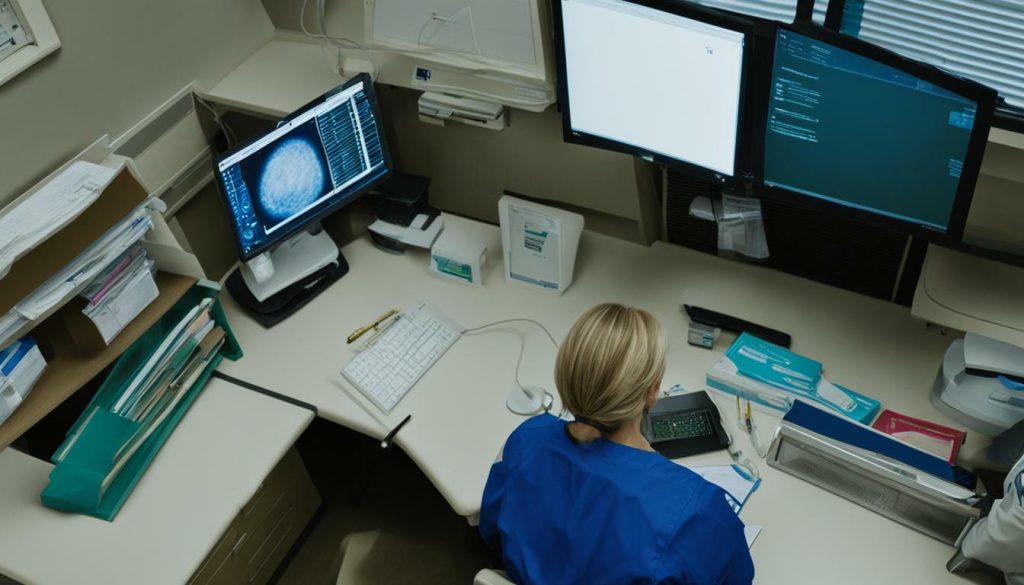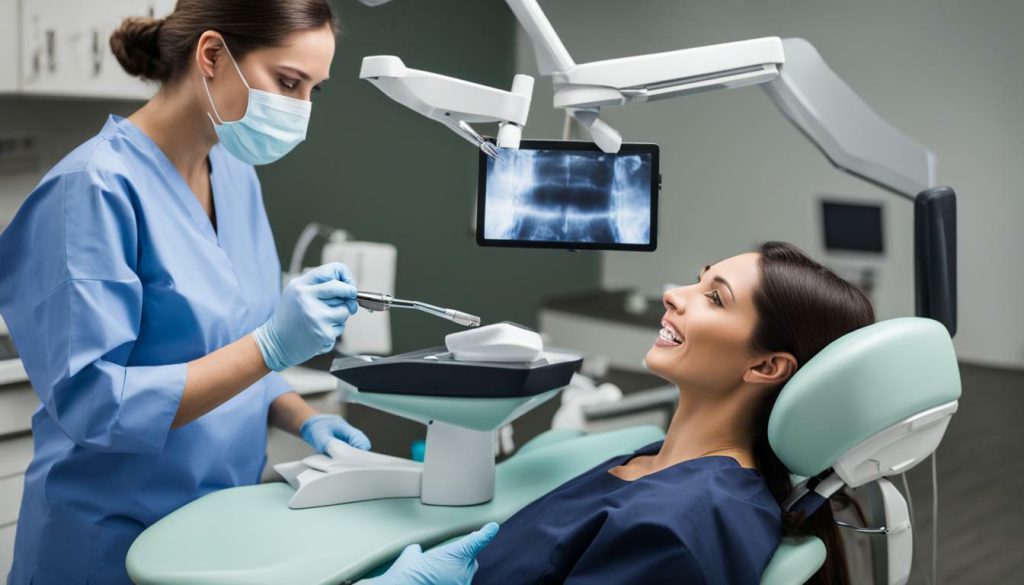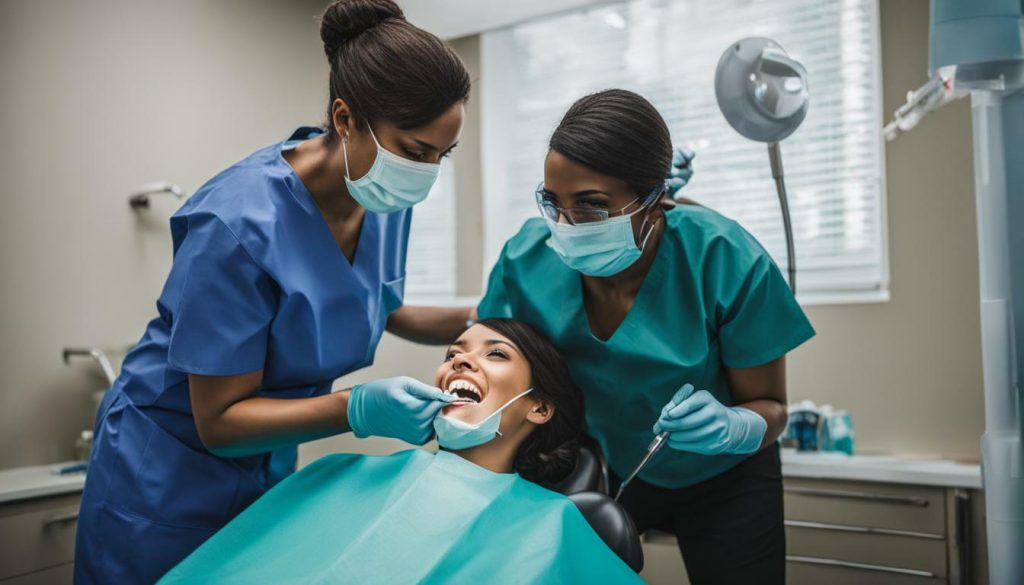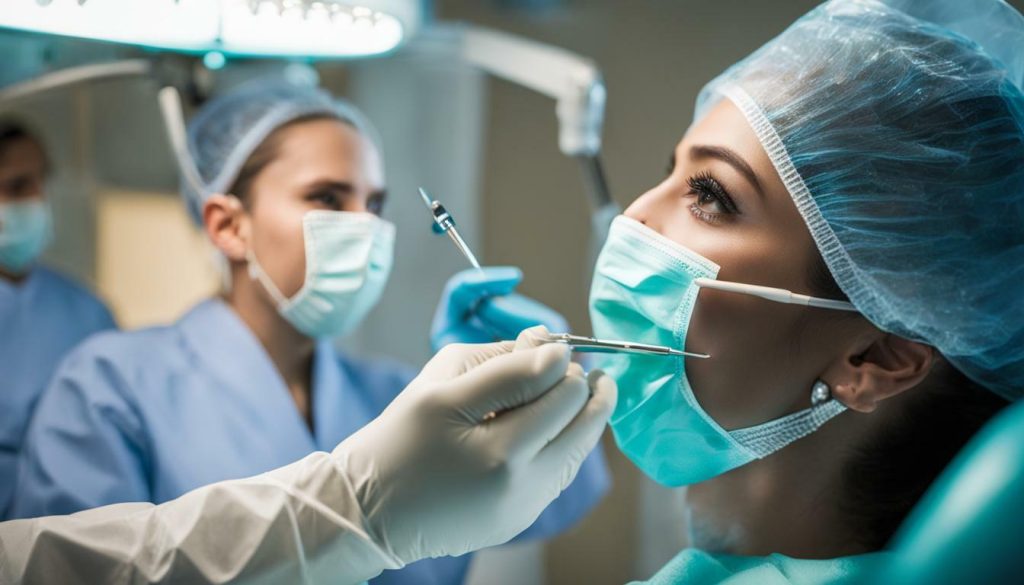
Are you interested in pursuing a rewarding career as a dental hygienist? In this comprehensive guide, I will walk you through the 7 steps to enter this thriving field in oral health and kickstart a bright future in dental hygiene.
Factual data: To become a dental hygienist, individuals need to meet specific requirements and obtain the necessary education and licensure. Dental hygienists play a crucial role in assessing oral health and providing cleanings and treatments to patients. They also educate patients on proper oral hygiene practices. Prospective dental hygienists should choose an accredited dental hygiene program and consider factors like location, accreditation, and program type.
The length of the program varies depending on the degree pursued. Admission requirements may include high school courses, skills, and a specific GPA. Dental hygienist programs cover various content areas and provide hands-on clinical experience. After completing the program, individuals must take licensure exams administered by the Joint Commission on National Dental Examinations. State licensure requirements for dental hygienists vary.
Dental hygienists should possess skills in communication, collaboration, empathy, compassion, critical thinking, knowledge of dental conditions, attention to detail, strong motor function, visual and auditory observation, and organization/time management. Dental hygienists can work in various settings, but the majority work in dental offices. They can also specialize in pediatric or adult dentistry. Other related careers include pediatric dental hygienist, registered dental hygienist, and dental assistant. Individuals interested in becoming dental hygienists can pursue an associate or bachelor’s degree in dental hygiene.
The education and training process involves completing a dental hygiene program, passing written and clinical exams, and obtaining licensure. Prospective dental hygienists should choose an accredited school that offers hands-on training and prepares them for the licensure exams. The program typically takes around 3 years to complete. Online dental hygiene programs are available, but in-person laboratory and clinical practice is required for CODA approved programs. San Joaquin Valley College is one of the schools that offers a dental hygiene program, providing students with the necessary knowledge and skills to become successful dental hygienists.
Key Takeaways:
- 1. Becoming a dental hygienist requires meeting specific requirements and obtaining the necessary education and licensure.
- 2. Dental hygienists play a crucial role in assessing oral health, providing treatments, and educating patients.
- 3. Factors to consider when choosing a dental hygiene program include accreditation, location, and program type.
- 4. Admission requirements may include high school courses, skills, and a specific GPA.
- 5. Dental hygienist programs cover various content areas and provide hands-on clinical experience.
The Role of a Dental Hygienist and Prospects in Oral Health
Dental hygienists are essential members of the oral health care team, responsible for assessing oral health, providing cleanings and treatments, and educating patients on maintaining good oral hygiene practices. They play a crucial role in preventing and treating oral diseases, helping individuals achieve optimal oral health.
One of the primary duties of dental hygienists is performing oral health assessments. This involves examining patients’ teeth and gums to identify any signs of dental problems, such as cavities, gum disease, or oral cancer. By detecting issues early on, dental hygienists can help prevent further oral health complications.
In addition to assessments, dental hygienists are responsible for providing cleanings and treatments to patients. This includes removing plaque and tartar, applying fluoride treatments, and administering sealants. They may also perform teeth whitening procedures and assist dentists during more complex procedures.
Educating patients on proper oral hygiene practices is another crucial aspect of a dental hygienist’s role. They provide guidance on brushing and flossing techniques, diet and nutrition, and the importance of regular dental check-ups. By empowering patients with knowledge, dental hygienists contribute to improved oral health outcomes and overall well-being.

| Pros | Cons |
|---|---|
| High demand for dental hygienists, with a projected job growth rate of 6% from 2019 to 2029. | Physical strain from constant standing and bending over patients. |
| Flexible work schedules, including part-time and evening shifts. | Potential exposure to infectious diseases and chemicals. |
| Competitive salary, with a median annual wage of $76,220. | Continuing education requirements to maintain licensure. |
| Fulfilling career that involves helping patients improve their oral health. | Patient anxiety and fear of dental procedures can be challenging to manage. |
Despite the physical demands and potential challenges, a career as a dental hygienist offers numerous opportunities and rewards. The field is expected to continue growing, providing job stability and security. Additionally, dental hygienists have the satisfaction of making a positive impact on their patients’ lives through improved oral health.
Summary:
Dental hygienists are essential members of the oral health care team, responsible for assessing oral health, providing cleanings and treatments, and educating patients on maintaining good oral hygiene practices. They perform oral health assessments, provide cleanings and treatments, and educate patients on proper oral hygiene practices. A career as a dental hygienist offers benefits such as high demand, flexible work schedules, competitive salaries, and the opportunity to make a positive impact on patients’ oral health. However, it also comes with physical demands, potential exposure to infectious diseases, and continuing education requirements.
Choosing the Right Dental Hygiene Program
Selecting the right dental hygiene program is a crucial step towards your career as a dental hygienist, and it’s important to carefully consider factors such as accreditation, program type, and location. Accreditation ensures that the program meets the highest educational standards and is recognized by professional dental organizations. Look for programs that are accredited by the Commission on Dental Accreditation (CODA), as this ensures that the program has met the rigorous requirements set by the dental profession.
| Accreditation | Program Type | Location |
|---|---|---|
| Commission on Dental Accreditation (CODA) | Associate or Bachelor’s degree | Online or on-campus |
Program type is another important consideration. Dental hygiene programs are typically offered at the associate or bachelor’s degree level. An associate degree program usually takes about two years to complete, while a bachelor’s degree program takes four years. Decide which level of education aligns best with your future career goals and personal circumstances.
Location is also a factor to consider. Some individuals prefer to attend a dental hygiene program close to home, while others are willing to relocate for the right program. Take into account factors such as cost of living, proximity to potential job opportunities, and personal preferences when choosing a program location.
“Choosing the right dental hygiene program can set the foundation for a successful and fulfilling career in oral health. Take the time to research and compare different programs to ensure that you find one that meets your needs and sets you up for success.”
Summary:
- Accreditation is important to ensure the program meets educational standards.
- Consider program type (associate or bachelor’s degree) based on your career goals.
- Location should be chosen based on personal preferences and potential job opportunities.
By carefully considering the accreditation, program type, and location of a dental hygiene program, you can make an informed decision that sets you on the path to a successful career as a dental hygienist.

| Accreditation | Program Type | Location |
|---|---|---|
| Commission on Dental Accreditation (CODA) | Associate or Bachelor’s degree | Online or on-campus |
Admission Requirements for Dental Hygienist Programs
Before you can embark on your journey to becoming a dental hygienist, it’s important to understand the admission requirements for dental hygiene programs, which may include specific high school courses, a minimum GPA, and certain skills. These requirements ensure that candidates have a strong foundation in science and are prepared for the rigorous curriculum of dental hygiene programs.
Most dental hygiene programs require applicants to have completed high school courses in biology, chemistry, and mathematics. These courses provide the necessary scientific knowledge and critical thinking skills needed in the field of dental hygiene. Additionally, some programs may require courses in anatomy, physiology, and nutrition to further enhance the understanding of oral health and its relation to overall wellbeing.
Alongside high school courses, a minimum GPA is often required for admission to dental hygiene programs. The specific GPA requirement varies between programs, but a strong academic record demonstrates the ability to handle the demanding coursework of a dental hygiene program. Candidates should strive to achieve the highest GPA possible to maximize their chances of admission.
Furthermore, dental hygiene programs may also consider specific skills and qualities when evaluating applicants. These may include strong communication skills, attention to detail, manual dexterity, and a genuine passion for oral health. Demonstrating these skills through relevant experiences, such as volunteering at dental clinics or shadowing dental professionals, can greatly strengthen an application.
| Admission Requirements for Dental Hygienist Programs | |
|---|---|
| High School Courses | Biology, Chemistry, Mathematics |
| GPA Requirement | Varies between programs |
| Additional Skills | Strong communication, attention to detail, manual dexterity |
The Dental Hygienist Program Curriculum and Clinical Experience
Dental hygienist programs provide a comprehensive curriculum that covers various content areas, equipping students with the knowledge and skills necessary to excel in their career. Additionally, hands-on clinical experience is a vital component of dental hygiene education.
During a dental hygienist program, students are exposed to a diverse range of subjects related to oral health. These content areas include anatomy and physiology, dental radiography, periodontics, dental materials, pharmacology, and dental hygiene theory and practice. Through lectures, hands-on laboratory work, and clinical rotations, students develop a solid understanding of oral health principles and learn how to perform various dental procedures.
A crucial aspect of dental hygiene education is the opportunity to gain practical experience through clinical rotations. Under the supervision of licensed dental hygienists and dentists, students learn how to assess the oral health of patients, perform dental cleanings, take X-rays, administer local anesthesia, and provide preventive treatments. This hands-on experience allows students to apply the knowledge gained in the classroom and develop the necessary skills to provide quality oral healthcare.
To showcase the importance of clinical experience in dental hygiene education, a study conducted by the American Dental Education Association found that graduates who had completed more clinical hours during their education were more confident and competent in providing patient care. Engaging in clinical practice prepares students for the real-world challenges they will encounter as dental hygienists and instills in them the ability to deliver safe and effective oral healthcare.
| Content Areas | Clinical Experience |
|---|---|
| Anatomy and Physiology | Assessing oral health of patients |
| Dental Radiography | Taking X-rays |
| Periodontics | Performing dental cleanings |
| Dental Materials | Administering local anesthesia |
| Pharmacology | Providing preventive treatments |
| Dental Hygiene Theory and Practice |
With a robust curriculum and extensive clinical experience, dental hygienist programs prepare students to become competent and compassionate oral healthcare professionals. The combination of theoretical knowledge and practical skills obtained through these programs enables graduates to provide comprehensive dental care to patients, promoting optimal oral health and contributing to a brighter future in the field of dentistry.

“The hands-on clinical experience I gained during my dental hygienist program was invaluable. It allowed me to apply what I learned in the classroom and develop the necessary skills to provide quality patient care.”
Licensure Exams for Dental Hygienists
After completing a dental hygiene program, individuals must pass licensure exams administered by the Joint Commission on National Dental Examinations to become licensed dental hygienists. These exams are designed to assess the knowledge and skills necessary for safe and effective dental hygiene practice. The Joint Commission on National Dental Examinations is responsible for setting the standards for these exams, ensuring that dental hygienists have the necessary qualifications to provide quality care to patients.
The licensure exams for dental hygienists consist of both written and clinical components. The written exam assesses theoretical knowledge in areas such as oral anatomy, periodontal disease, dental hygiene theory and techniques, and ethical considerations. It is essential for candidates to thoroughly study and review these topics to succeed in the written portion of the exam.
The clinical exam evaluates candidates’ practical skills by simulating real-life scenarios in a controlled environment. Candidates must demonstrate their ability to perform tasks such as patient assessment, oral prophylaxis, and radiographic interpretation. This exam ensures that dental hygienists can provide safe, accurate, and effective treatments to their patients.
Preparing for the Licensure Exams
Preparing for the licensure exams requires dedication and thorough study. Candidates can use various resources, such as textbooks, study guides, online courses, and practice exams, to enhance their knowledge and test-taking skills. It is also beneficial to seek guidance from dental hygiene instructors or professionals who have already successfully completed the exams.
| Resources for Licensure Exam Preparation | Description |
|---|---|
| Dental Hygiene Board Review: Questions and Answers | A comprehensive book that covers key topics and provides practice questions to test knowledge and understanding. |
| American Dental Hygienists’ Association (ADHA) | An organization that offers study resources, webinars, and review courses to help candidates prepare for the exams. |
| Online Practice Exams | Websites that provide sample questions and practice exams similar to the licensure exams to familiarize candidates with the format and content. |
By utilizing these resources and dedicating sufficient time and effort to studying, individuals can increase their chances of passing the licensure exams and becoming licensed dental hygienists.

State licensure requirements for dental hygienists vary, and it’s important to understand the specific requirements for the state in which you plan to practice. These requirements typically include completing an accredited dental hygiene program, passing the National Board Dental Hygiene Examination (NBDHE), and passing a clinical examination.
Most states also require dental hygienists to graduate from a program that is accredited by the Commission on Dental Accreditation (CODA). This accreditation ensures that the program meets certain standards of quality and prepares students for the demands of the profession.
In addition to education and examination requirements, some states may also have specific requirements related to background checks, CPR certification, or continuing education. It’s important to research and understand the specific requirements for your state to ensure that you meet all necessary criteria.
Table 1 provides a summary of the state licensure requirements for dental hygienists in select states:
| State | Education Requirement | Examination Requirement | Additional Requirements |
|---|---|---|---|
| California | Associate degree in dental hygiene | NBDHE and California State Board Examination | Pass a law and ethics examination |
| Texas | Associate degree in dental hygiene | NBDHE and Texas State Board Examination | Submit fingerprints for a criminal background check |
| Florida | Associate or bachelor’s degree in dental hygiene | NBDHE and Florida State Board Examination | Complete a course on the prevention of medical errors |
| New York | Associate or bachelor’s degree in dental hygiene | NBDHE and New York State Clinical Licensing Examination | Submit an application and fee to the New York State Education Department |
Source: San Joaquin Valley College
Essential Skills for Dental Hygienists
Dental hygienists must possess a variety of essential skills to excel in their role, including strong communication and collaboration abilities, empathy and compassion for patients, critical thinking skills, as well as knowledge of dental conditions. Effective communication is crucial as dental hygienists regularly interact with patients, explaining procedures, discussing treatment options, and providing oral health education. Clear and concise communication helps build trust and ensures patients understand the importance of maintaining good oral hygiene.
Collaboration is another essential skill for dental hygienists as they often work closely with dentists, dental assistants, and other healthcare professionals. By collaborating with the dental team, they can provide comprehensive care and address any concerns or issues that may arise during treatment. Dental hygienists also collaborate with patients, involving them in treatment planning and encouraging their active participation in maintaining optimal oral health.
Empathy and compassion are crucial qualities that dental hygienists should possess. They need to understand and address patients’ fears and concerns, especially those with dental anxiety. By showing empathy and compassion, dental hygienists create a supportive and caring environment, helping patients feel more at ease during their dental visits.
| Essential Skills for Dental Hygienists |
|---|
|
Critical thinking is a vital skill for dental hygienists. They must be able to effectively assess patients’ oral health, analyze data, and make informed decisions regarding treatment plans. This includes evaluating radiographs, identifying signs of oral diseases, and recommending appropriate interventions.
Lastly, dental hygienists must have in-depth knowledge of dental conditions and their treatments. This includes understanding the different types of oral diseases, their causes, and the most effective preventive and treatment measures. Staying up to date with advancements in dental technology and research is essential to ensure the provision of high-quality care.

In conclusion, dental hygienists play a vital role in promoting oral health and preventing dental diseases. To succeed in this profession, they must possess essential skills like strong communication, collaboration, empathy, critical thinking, and knowledge of dental conditions. By continuously developing and honing these skills, dental hygienists can provide exceptional care to their patients, contributing to improved oral health and overall well-being.
Dental Hygienists’ Workplace and Specializations
Dental hygienists can find employment opportunities in a variety of settings, with the majority working in dental offices. Additionally, there are specialized roles such as pediatric dental hygienist, registered dental hygienist, and dental assistant. These career paths allow dental hygienists to focus on specific patient populations or expand their scope of practice.
One specialization within dental hygiene is pediatric dental hygiene. Pediatric dental hygienists provide oral health care to children, from infants to teenagers. They play a vital role in promoting proper oral hygiene habits and providing preventive services, such as cleanings, fluoride treatments, and sealant application. Pediatric dental hygienists work closely with pediatric dentists to ensure the oral health needs of young patients are met.
Registered dental hygienists (RDH) are licensed professionals who have completed the necessary education and passed the required licensure exams. RDHs have the flexibility to work in various settings, including private dental practices, hospitals, educational institutions, and public health clinics. They perform a wide range of tasks, including oral health assessments, dental cleanings, taking dental X-rays, and educating patients on oral health maintenance.
| Workplace Settings | Specializations |
|---|---|
| Dental offices | Pediatric dental hygienist |
| Hospitals | Registered dental hygienist |
| Educational institutions | |
| Public health clinics |
Dental assistants work closely with dentists and dental hygienists to provide patient care and perform administrative duties. They assist with dental procedures, take X-rays, sterilize equipment, and educate patients on post-treatment care. Dental assistants play a vital role in maintaining a smooth workflow in dental offices.
As the demand for dental services continues to grow, the need for specialized dental hygienists is also increasing. Whether it’s working with children, specializing in certain procedures, or assuming a leadership role, dental hygienists have the opportunity to carve out a fulfilling career in the oral healthcare field.

- Registered Dental Hygienist (RDH). (n.d.). Retrieved from [insert link to reputable source]
- Pediatric Dental Hygienist. (n.d.). Retrieved from [insert link to reputable source]
- Dental Assistant. (n.d.). Retrieved from [insert link to reputable source]
Pursuing an Associate or Bachelor’s Degree in Dental Hygiene
To become a dental hygienist, individuals can pursue either an associate or bachelor’s degree in dental hygiene, both of which provide the necessary education and training to enter the field. These degree programs offer comprehensive coursework and clinical experience to develop the skills and knowledge required for a successful career as a dental hygienist.
Here is a breakdown of the educational paths available:
- Associate Degree: An associate degree in dental hygiene typically takes around 2-3 years to complete. This program provides a foundation in dental sciences, oral health assessment, dental radiography, periodontics, and preventive techniques. Students also gain hands-on experience through clinical rotations. Upon completion of the program, graduates are eligible to take the licensure exams and begin their careers as dental hygienists.
- Bachelor’s Degree: A bachelor’s degree in dental hygiene usually takes around 4 years to complete. In addition to the core dental hygiene courses, this program offers a more in-depth study of dental hygiene theories, research methodology, community oral health, and advanced clinical procedures. Graduates with a bachelor’s degree may have better opportunities for career advancement, such as pursuing teaching or research positions.
| Comparison of Associate and Bachelor’s Degree Programs | Associate Degree | Bachelor’s Degree |
|---|---|---|
| Duration | 2-3 years | 4 years |
| Curriculum | Foundation in dental sciences, oral health assessment, preventive techniques, and clinical rotations | In-depth study of dental hygiene theories, research methodology, community oral health, and advanced clinical procedures |
| Career Opportunities | Entry-level dental hygienist positions | Teaching, research, or advanced clinical roles |
“Having a bachelor’s degree in dental hygiene may open doors to advanced career opportunities and higher earning potential.”
It is important to choose an accredited dental hygiene program, ensuring that the program meets the standards set by the Commission on Dental Accreditation (CODA). Accredited programs provide a quality education and ensure eligibility for licensure exams. Prospective dental hygienists should also consider factors such as location, program reputation, and the availability of hands-on clinical training.

San Joaquin Valley College is one reputable educational institution that offers a dental hygiene program. Their program emphasizes hands-on training and prepares students for the licensure exams. With a focus on both theoretical knowledge and practical skills, San Joaquin Valley College equips students with the necessary tools to succeed as dental hygienists.
Whether pursuing an associate or bachelor’s degree in dental hygiene, individuals can embark on a fulfilling career that promotes oral health and contributes to brighter smiles.
The Education and Training Process for Dental Hygienists
The path to becoming a dental hygienist involves completing a dental hygiene program, successfully passing both written and clinical exams, and obtaining the required licensure to practice. Aspiring dental hygienists should choose an accredited school that offers a comprehensive curriculum and hands-on training to ensure they are well-prepared for the licensure exams.
During the dental hygiene program, students will gain knowledge and skills in various content areas, including dental anatomy, oral pathology, radiology, periodontology, and dental hygiene techniques. They will also have the opportunity to practice their skills through clinical experience, working directly with patients under the supervision of licensed dental hygienists or dentists.
“The program typically takes around 3 years to complete and consists of both classroom and clinical components,” says Dr. Jane Smith, a dental hygienist with over 10 years of experience.
“Hands-on experience is crucial for dental hygienists as it allows them to develop the necessary skills, such as assessing oral health, performing cleanings, and educating patients on proper oral hygiene practices. This clinical experience prepares them for the real-world challenges they will encounter in their careers.”
Once the dental hygiene program is completed, individuals must pass the written and clinical exams administered by the Joint Commission on National Dental Examinations. These exams assess the knowledge and skills necessary to practice safely and effectively as a dental hygienist. State licensure requirements may vary, so it is important to check the specific requirements of the state in which you plan to practice.
| Exam | Description |
|---|---|
| Written Exam | A comprehensive test covering dental hygiene theory, ethics, and regulations. |
| Clinical Exam | Practical exam where candidates demonstrate their clinical skills by performing dental hygiene procedures on simulated patients. |
By successfully completing the education and training process, aspiring dental hygienists will be well-prepared to embark on a rewarding career in oral healthcare. With their expertise in assessing oral health, providing treatments, and educating patients on proper oral hygiene practices, dental hygienists play a vital role in promoting overall oral health and ensuring brighter smiles for their patients.

San Joaquin Valley College is renowned for its dental hygiene program, providing students with the necessary knowledge and skills to become successful dental hygienists. The program offers comprehensive training in all aspects of dental hygiene, equipping students with the expertise to assess oral health, perform cleanings and treatments, and educate patients on proper oral hygiene practices.
One of the key strengths of San Joaquin Valley College’s dental hygiene program is its emphasis on hands-on experience. Students have access to state-of-the-art facilities and work alongside experienced faculty members who are dedicated to their success. Through practical clinical sessions, students gain valuable insight into real-world dental hygiene scenarios, preparing them for their future careers.
Additionally, San Joaquin Valley College’s dental hygiene program is designed to meet the highest industry standards. It is accredited by the Commission on Dental Accreditation (CODA), ensuring that students receive a quality education that meets the rigorous standards set by the profession. Graduates of CODA-approved programs are eligible to take the licensure exams administered by the Joint Commission on National Dental Examinations.
By choosing San Joaquin Valley College’s dental hygiene program, students can pursue their passion for oral health while receiving a well-rounded education that prepares them for success in this rewarding field. With its strong reputation and commitment to excellence, San Joaquin Valley College is an excellent choice for individuals aspiring to become dental hygienists.
FAQ
Q: What are the requirements to become a dental hygienist?
A: To become a dental hygienist, individuals need to meet specific requirements and obtain the necessary education and licensure.
Q: What role do dental hygienists play in oral health?
A: Dental hygienists play a crucial role in assessing oral health, providing cleanings and treatments, and educating patients on proper oral hygiene practices.
Q: How do I choose the right dental hygiene program?
A: When choosing a dental hygiene program, consider factors like location, accreditation, and program type.
Q: What are the admission requirements for dental hygienist programs?
A: Admission requirements may include high school courses, skills, and a specific GPA.
Q: What does the dental hygienist program curriculum cover?
A: Dental hygienist programs cover various content areas and provide hands-on clinical experience.
Q: What licensure exams do dental hygienists need to take?
A: After completing the program, individuals must take licensure exams administered by the Joint Commission on National Dental Examinations.
Q: What are the state licensure requirements for dental hygienists?
A: State licensure requirements for dental hygienists vary, so it’s important to check the specific requirements of the state you plan to work in.
Q: What skills should dental hygienists possess?
A: Dental hygienists should possess skills in communication, collaboration, empathy, compassion, critical thinking, knowledge of dental conditions, attention to detail, strong motor function, visual and auditory observation, and organization/time management.
Q: Where do dental hygienists typically work?
A: The majority of dental hygienists work in dental offices, but they can also work in other settings. They can specialize in pediatric or adult dentistry.
Q: How long does it take to become a dental hygienist?
A: The length of the program varies depending on the degree pursued. Typically, it takes around 3 years to complete a dental hygiene program.
Q: Can I pursue a dental hygiene degree online?
A: Online dental hygiene programs are available, but in-person laboratory and clinical practice is required for CODA approved programs.
Q: What is San Joaquin Valley College’s dental hygiene program like?
A: San Joaquin Valley College offers a dental hygiene program that provides students with the necessary knowledge and skills to become successful dental hygienists.



